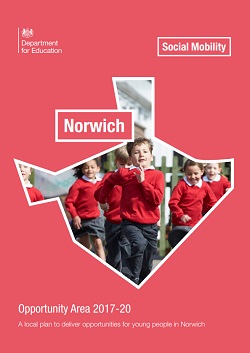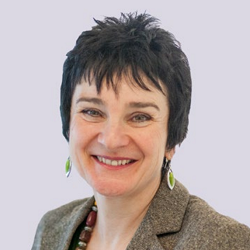The government has released plans for the first six of its “opportunity areas”.
The plans set out how each area will spend £6 million of funding, aimed at improving social mobility.
A lot of the plans focus on school improvement, and some famous faces from the schools community have been appointed to chair some of the areas’ partnership boards.
Here is a summary of what each area plans to do for schools…
1. Blackpool

The chair of the Blackpool opportunity area partnership board is Graham Cowley, who works for Aldridge Education, a multi-academy trust.
A former executive director of Capita, Cowley is also chair of UTC@MediaCityUK and a director of the Lancashire local enterprise partnership (LEP).
He says the plan for his area will deliver “a significant and lasting impact” between 2017 and 2020.
Priorities for schools in Blackpool
- Leadership and governance improvement – National Professional Qualifications to be fully-funded for local teachers. Tauheedul Teaching School to lead on strategic school improvement.

- Maths teaching – A local maths hub will be built and might extend support to post-16 providers
- English outcomes – Ruth Miskin programmes fully-funded in “up to six schools”
- Improve STEM teaching – Projects will be run by STEM Learning and the Institute of Phsyics
- Improve MFL teaching – The British Council will do this, but it doesn’t say how
- Improve teaching overall – A new research school, St Mary’s Catholic Academy, will support others using the “best available evidence and research”
- Strength collegial working – Via a new secondary heads group
- Improve transition – Awaiting proposals.
2. Derby

Professor Kathryn Mitchell is chair of the Derby opportunity area partnership board. She is the vice-chancellor of the University of Derby.
Mitchell is a psychologist and the former deputy vice-chancellor of the University of West London.
She says: “We want Derby to become a centre of excellence for education and employment in science, technology, engineering, arts
and mathematics.”
Priorities for schools in Derby
- Improve teaching and attainment through research – Wyndham Primary Academy, the local research school, will be funded to give access to research findings

- Tailored school improvement support – The DfE, Derby City Council, teaching schools and school leaders, will create school-specific plans
- Maths teaching – Embed maths mastery in primary schools supported by the local maths hub. Support for secondary schools and further education colleges will also be developed
- Leadership development – TLIF programmes will run in schools. More than 100 teachers can take new national professional qualifications for free. Numbers of locally-based national leaders of education will be increased.
3. North Yorkshire coast

Sir Martin Narey, a former adviser to Michael Gove, chairs North Yorkshire’s partnership board.
Narey is a former director general of the prisons service and ran the children’s charity Barnardo’s until 2011. Last year he authored an influential report on the state of children’s residential care in England.
He is “proud of the ambition” in the plan, which will “focus on things we know will make a difference, because they have done so elsewhere”.
Priorities for schools on the North Yorkshire coast
- Maths teaching – A new maths centre, supported by the local maths hub and research school, will be identified. The local maths hub project will be extended. Every school will be encouraged to run two training events. There will be a project to assess the themes emerging from SATs results

- Literacy – A new literacy campaign and hub will “nurture a love of reading”. Work to improve support for teachers will be commissioned.
- Phonics – Up to five primary schools will get a “significant training package”
- Secondary school improvement – A plan will be drawn up with the help of schools, the local authority and the regional schools commissioner. This will include help for academy trusts to access leadership support, securing “strong” sponsors for two inadequate-rated secondary schools, a “comprehensive CPD offer” and SSIF spending
- Academic resilience – Will review whether a successful resilience project in primary schools can be expanded to secondary level
- Parental engagement – Secondary schools will be supported to commission evidence-based approaches to parent engagement
- SEND – Training will be provided for six SEND reviewers, and a SEND regional leader will be appointed
4. Norwich

The former regional schools commissioner for the east of England, Dr Tim Coulson, will chair the Norwich partnership board.
Now chief executive of the Samuel Ward Academy Trust, Coulson says his vision for the region is to create a system where “no child is left behind”.
“We know that by working together with local and national stakeholders who share our vision, we can truly make a difference over the next three years.”
Priorities for schools in Norwich
- Language development – New language development training for teachers in five to seven schools

- Maths teaching – The local maths hub will develop “a range of training” for teachers in “all Norwich schools”
- Literacy teaching – Ruth Miskin Training to provide in-school support
- STEM teaching – STEM Learning’s “aspire to STEM” programme delivered in some schools
- Professional development – Leaders in primary schools will receive CPD
- Physics teaching – Support from the Institute of Physics for specialist and non-specialist teachers
- School improvement – SSIF-funded projects to help raise progress in: maths among girls at nine primary schools; attainment at key stages 3 and 4 in four secondary schools; and reading comprehension for disadvantaged pupils at key stage 2 at three primaries.
- Research – Notre Dame High School has become a research school and will run events, provide training and CPD. New Norwich evidence-based practice fund to be launched for schools and colleges to implement evidence-based approaches
5. Oldham

James Kempton, a former council leader who sits on the board of Ofsted and is clerk to the College of Teaching, is the chair of the Oldham partnership board.
Kempton, a Liberal Democrat politician who led Islington Council in the late 2000s, says young people growing up in Oldham “find it much harder” to achieve their life ambitions.
“The opportunity area – working through the partnership board – is a promise, made by national and local government, education leaders and teachers, voluntary organisations and employers, to make change happen.”
Priorities for schools in Oldham
- School readiness – Making it REAL, a National Children’s Bureau programme aimed at increasing early literacy, will be scaled-up and extended to include maths

- Leadership – National professional qualifications will be funded for up to 150 people in the first year. Training and support from Teach First for senior leadership teams. Coaching and training for primary school leaders. Access to programmes and qualifications from the Institute for Teaching
- Governance – Support from the “inspiring governance” service, which links volunteers with schools
- Phonics – “Whole-school” training from Ruth Miskin, to be delivered over two years
- STEM teaching – Support from STEM Learning and the Institute of Physics, targeted at schools rated inadequate or requires improvement
- Mental health – Impact and needs assessment, plus baseline data, to be complete by the end of 2018. Schools will be supported to develop mental health plans
6. West Somerset

Dr Fiona McMillan, the former principal of Bridgwater College, has been appointed to chair West Somerset’s partnership board.
McMillan retired in 2011 having led the FE institution since 1994. She is also a former president of the Association of Colleges.
“Our vision is to create a culture where all children in West Somerset have the best opportunities to learn, achieve and gain worthwhile and progressive employment,” she said.
Priorities for schools in West Somerset
- Maths teaching – Intervention to improve attainment at key stages 1, 2 and 3 — drawing on the local maths hub’s resources. The board will support a SSIF bid to improve maths in at least six schools

- Literacy teaching – Specialist phonics expertise, linking to development of practice in the early years. TLIF-funded CPD in phonics. A review of phonics through the Somerset Literacy Network
- Improve transition – Somerset County Council to initially lead co-ordination between schools
- SEND – Use of local consortium to support schools to review their own practice and learn from others. Training for six SEND reviewers, and appointment of a SEND regional leader
- Leadership – Funding for at least eight leaders to take national professional qualifications. Efforts to identify heads, governors and schools with potential to become national leaders of education, national leaders of governance and teaching schools
- STEM teaching – TLIF-funded programme to offer CPD in STEM subjects
- Research – The Blue School in Wells is to become a research school
- Teach First – West Somerset to be prioritised in future rounds of recruitment








Your thoughts